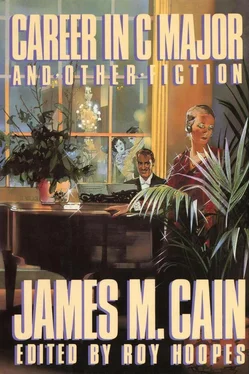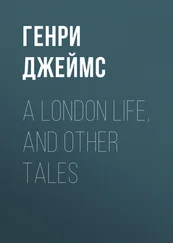“ Me — put on funny clothes and get out there and — do I have to paint up my face?”
“You use make-up, of course.”
“It’s out.”
But then when I asked her what she got, and she said $400 a night, and that she had taken a cut from $500, I knew perfectly well that that was part of what they had been arguing about too, that she had taken that cut to get me in, so I could be with her, and that kind of got me. I thought it was the screwiest thing I had ever heard of, but I finally said yes.
If you think a concert is tough, don’t ever try grand opera. I hear it’s harder to go out there all alone, with only a piano to play your accompaniments and no scenery to help you out, and I guess it is, when you figure the fine points. But if you’ve never even heard of the fine points yet, and you’re not sure you can even do it at all, you stick to something simple. Remember what I’m telling you: lay off grand opera.
We hit Chicago the next day, just the two of us, because Wilkins went back to New York after the Columbus concert. The first thing we did, after we got hotel rooms, was go around to the costumer’s. That’s a swell place. There’s every kind of costume you ever heard of, hanging on hooks, like people that have just been lynched, from white flannel tenor suits with brass buttons up the front, to suits of armor, to naval uniforms, to cowboy clothes, to evening clothes and silk hats. It’s all dark, and dusty, and shabby, and about as romantic as a waxworks.
They were opening in Bohème Monday night, and we were both in it, and that meant the first thing we had to get was the Marcel stuff. She already had her costumes, you understand. This was all on account of me. Marcel was the character I was to sing in the opera, the baritone role. There wasn’t any trouble about him. I mean, they didn’t have to make any stuff to order, because a pair of plaid pants, a velvet smoking jacket of a coat, and a muffler and floppy hat for the outdoor stuff, were all I had to have. They had that stuff, and I tried it on, and it was all right, and they set it aside. But when it came to the Rigoletto stuff, and they opened a book and showed me a picture of what I would have to have, I almost broke for the station right there. I knew he was supposed to be some kind of a hump-backed jester, but that I would have to come out in a foolish-looking red suit, and actually wear cap and bells, that never once entered my mind.
“I really got to wear that outfit?”
“Why of course.”
“My God.”
She paid hardly any attention to me, and went on talking with the costumer. “He has to sing it Wednesday, and he’ll have no chance for a fitting Monday. Can you fit Tuesday and deliver Wednesday?”
“Absolutely, Miss. We guarantee it.”
“Remember to fit over the hump.”
“We’ll even measure over the hump. I think he’d better put a hump on right now. By the way, has he got a hump?”
“No, he’ll have to get one.”
“We have two types of hump. One that goes on with straps, the other with elastic fabric fastenings, adjustable. I recommend the elastic fabric, myself. It’s more comfortable, stays in place better, doesn’t interfere with breathing—”
“I think that’s better.”
So I put on a hump, and got measured for the monkey suit. Then it turned out that for two of the acts I would have to have dark stuff, and a cape, and another floppy hat. They argued whether the Bohème hat wouldn’t do, and finally decided it would. Then we tried on capes. The one that seemed to be elected hiked up in back, on account of the hump, but the costumer thought I ought to take it, just the same. “We could make you a special one, to hang even all around, but if you take my advice, you’ll have this one. That little break in the line won’t make much difference, and then, if you have a cape that really fits you, without that hump I mean, you can use it in other operas — Lucia, Trovatore, Don Giovanni, you know what I mean? A nice operatic cape comes in handy any time, and—”
“O. K. I’ll take that one.”
Then it turned out I would have to have a red wig, and we tried wigs on. When we got around to the Traviata stuff I didn’t even have the heart to look, and ordered blind. Anything short of a hula skirt, I thought, would be swell. Then it seemed I had to have a trunk, a special kind, and we got that. I’d hate to tell you what all that stuff cost. We came out of there with the Marcel stuff, the wig, the hump, the cape, and a make-up kit done up in two big boxes, the other stuff to come. When we got back to the hotel we went up and I dumped the stuff down on the floor. “What’s the matter, Marcellino? Don’t you feel well?”
“I feel lousy.”
There’s no rehearsals for principals in the American Scala. You know your stuff or you don’t get hired. But I was a special case, and Pagano wasn’t taking any chances on me. He posted a call for the whole Boheme cast to take me through it Sunday afternoon, and maybe you think that wasn’t one sore bunch of singers that showed up at two o’clock. The men were all Italians, and they wanted to go to a pro football game that was being played that afternoon. The only other woman in the cast, the one that sang Musetta, was an American, and she was sore because she was supposed to give a lecture in a Christian Science temple, and had to cancel it. They couldn’t get the theatre, for some reason, so we did it downstairs in the new cocktail lounge of the hotel, that they didn’t use on Sundays. Rossi put chairs around to show doors, windows, and other stuff in the set, took the piano, and started off. The rest of them paid no attention to him at all, or to me. They knew Bohème frontwards, backwards, and sidewise, and they sat around with their hats on the back of their heads, working crossword puzzles in the Sunday paper. When it came time for them to come in they came in without even looking up. Cecil acted just like the others. She didn’t work puzzles, but she read a book. Every now and then a tall, disgusted-looking Italian would walk through and walk out again. I asked who he was, and they told me Mario, the conductor. He looked like if he had to listen to me much longer he would get an acute case of the colic. It was all as cheerful as cold gravy with grease caked on the top.
Rossi rehearsed me until I swear blood was running out of my nose, throat, and eyeballs. I never got enough pep in it to suit him. I had always thought grand opera was a slow, solemn, kind of dignified show, but the way he went about it it was a race between some sprinter and a mechanical rabbit. I was surprised how bad the others sounded. It didn’t seem to me any of them had enough voice to crush a grape.
Monday I tried to keep quiet and not think about it, but it was one long round of costumes, phone calls, and press releases. I was still singing under the name of Bennett, and when they called me down to give them some stuff about myself to go out to the papers, I was stumped. I wasn’t going to say who I really was. I gave them the biography of an uncle that came from Missouri, and went abroad to study medicine. Instead of the medical stuff in Germany, I made it musical stuff in Italy, and it seemed to get by all right. Around six-thirty, when I had just laid down, and thought I could relax a few minutes and get myself a little bit in hand, the phone rang and Cecil said it was time to go. We had to go early, because she had to make me up.
When we went in the stage door of the Auditorium Theatre that night, and I got my first look at that stage, I almost fainted. What I had felt in Rochester was nothing compared to this. In the first place, I had never had any idea that a stage could be that big, and still be a stage and not a blimp hangar. You only see about half of it from out front. The rest of it stretches out through the wings, and back, and up overhead, until you’d think there wasn’t any end of it. In the second place, it was all full of men, and monkey wrenches, and scenery going up on pulleys, and noise, so you’d think nobody could possibly sing on it, and be heard more than three feet. And in the third place, there was something about it that felt like big stuff about to happen. I guess that was the worst. Maybe an army headquarters, the night before a drive, or a convention hall, just before a big political meeting, would affect you that way too, but if you really want to get that feeling, so you really feel it, and it scares you to death, you go in a big opera house about an hour and a half before curtain time.
Читать дальше












